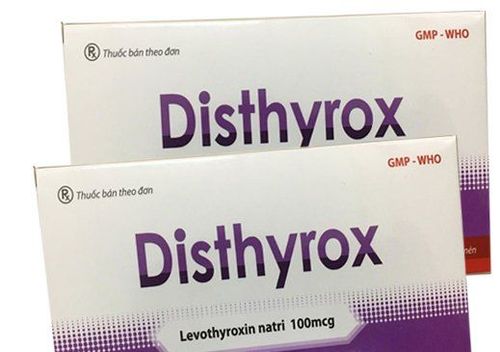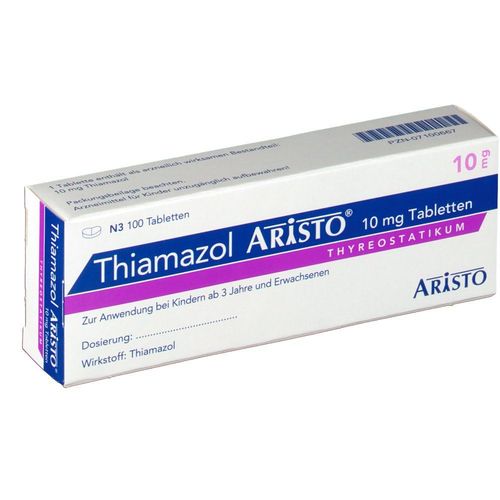This is an automatically translated article.
Drug L - Tyrox 100 has the main ingredient Levothyroxine sodium. L - Tyrox 100 is indicated in the complementary or alternative treatment of hypothyroidism in any age group of any etiology except transient hypothyroidism during convalescence of subacute thyroiditis.
1. What is L - Tyrox 100?
Drug L - Tyrox 100 has the main ingredient Levothyroxine sodium. L - Tyrox 100 is prepared in the form of round tablets with a content of 100mg. Levothyroxine is a synthetic active ingredient similar to the natural thyroid hormone T4, chemical name is 3,5,3',5'- tetraiodo L-thyronin. Levothyroxine may be called by other names such as T4, L-thyroxine, thyroxine. The thyroid gland is an endocrine gland that regulates metabolism through the secretion of two main hormones, triiodothyronin (T3) and thyroxine (T4). Of the two thyroid hormones, the circulating T4 hormone is secreted directly from the thyroid gland, while the majority of T3 hormone in the body is synthesized from T4 by deoxidation of 1 iodine in peripheral tissues. About 40% of the T4 hormone is converted to the T3 hormone and 40% is converted to the inactive T3. The metabolic activity of T3 hormone is about 3 to 5 times stronger than that of T4 hormone, so T3 hormone is considered the active form of thyroid hormone, while T4 hormone is a pro-hormone.
The main effect of thyroid hormone is to speed up the metabolism of body tissues, helping to regulate cell growth and differentiation. The deficiency of thyroid hormone in children will cause growth retardation, slow growth and development of the brain, slow maturation of the skeletal system and many other parts of the body. Thyroid hormone increases oxygen consumption in most tissues, speeds up basal metabolism and metabolism of sugars, proteins, and lipids. Thyroid hormone has a strong effect on every organ and is especially important for central nervous system development.
2. Uses of L - Tyrox 100
Indications for use of L - Tyrox 100 in the following cases:
Complementary or alternative treatment for hypothyroidism at any age due to any cause, except transient hypothyroidism during recovery subacute thyroiditis. Inhibition of thyrotropin secretion (TSH): This effect is useful in the treatment of simple goiter and chronic thyroiditis (Hashimoto), helping to reduce the size of the goiter. Combination of drugs L - Tyrox 100 with antithyroid drugs in the treatment of thyrotoxicosis . This treatment combination helps prevent goiter and hypothyroidism. On the other hand, the use of L - Tyrox 100 is contraindicated in the following cases:
Allergy or hypersensitivity to Levothyroxine. Thyrotoxicosis has not been treated with synthetic antithyroid drugs. Acute myocardial infarction, coronary insufficiency, decompensated heart failure, uncontrolled arrhythmia. Untreated adrenal insufficiency increases the need for adrenal hormones and can cause acute adrenal insufficiency. Patients after thyroid surgery but still have normal blood TSH levels.
3. How to take L - Tyrox 100
Drug L - Tyrox 100 for oral use, used only once a day. Drug L - Tyrox 100 should be taken on an empty stomach, usually before breakfast. Dosage of the drug L - Tyrox 100 must be adjusted according to the needs and response of each person. Specifically:
Mild hypothyroidism in adults
Starting dose: 50mcg/day x 1 time/day. Increase the daily dose by 25 to 50 mcg at intervals of 2 to 4 weeks until the desired therapeutic response is obtained. In patients with cardiovascular disease, the starting dose is 25 mcg/day or 50 mcg administered every other day (2 days/time). Adjust dose by 25 mcg every 4 weeks until therapeutic results are achieved. In patients without cardiovascular disease, the maintenance dose (100-200 micrograms) can be rapidly achieved after adjustment according to clinical judgment. Severe hypothyroidism in adults
Initial dose: 12.5 - 25mcg/time/day. Increase the daily dose by 25 mcg at intervals of 2 to 4 weeks until the desired therapeutic response is obtained. Maintenance dose: 75- 125 mcg/day x 1 time/day. Hypothyroidism in the elderly
Initial dose: 12.5 - 25mcg / time / day. Increase the daily dose by 3 to 4 weeks until the desired therapeutic response is obtained. Maintenance therapy: 100-200mcg/day, depending on the individual patient, higher doses may be used. .
Alternative dose treatment for children < 1 year old: 25 - 50 mcg/time/day.
Alternative dose treatment for children > 1 year old:
Dosage 3 - 5mcg/kg/day. The dose is gradually increased to an adult dose of about 150 micrograms/day, reaching in early or mid-teens. Some children may need a higher maintenance dose.
The dose of L - Tyrox 100 can be used as follows:
0 - 6 months: 25 - 50mcg or 8 - 10mcg/kg/day. 6 – 12 months: 50 – 75mcg or 6 – 8mcg/kg/day. 1-5 years: 75-100mcg or 5-6mcg/kg/day. 6-12 years old: 100-150mcg or 4-5mcg/kg/day. Over 12 years: Over 150mcg or 2-3mcg/kg/day. Overdosage of L - Tyrox 100 can cause an increased metabolic state similar to endogenous thyrotoxicosis. Symptoms of drug overdose L - Tyrox 100 may be encountered such as weight loss, restlessness, tremors, insomnia, fear of heat, fever, increased appetite, diarrhea, abdominal cramps, sweating, palpitations, rhythm rapid increase, arrhythmia, increased blood pressure, menstrual disorders ... These overdose symptoms are not always obvious, may appear after taking the drug for many days.
Drug L - Tyrox 100 should be temporarily stopped or dose reduced if signs and symptoms of overdose appear. In case of acute overdose, immediate symptomatic and supportive treatment is required. The aim of treatment is to reduce absorption from the gastrointestinal tract, to counteract the effects on the central and peripheral nervous system, mainly by increasing sympathetic activity.
Unless there are contraindications such as coma, convulsions or loss of vomiting reflex, if possible, perform gastric lavage immediately or induce vomiting. Cholestyramine or activated charcoal is used to reduce absorption of levothyroxine. Maintain ventilation, give oxygen if needed. Use a beta-adrenergic blocker such as propranolol to combat sympathetic hyperactivity. Intravenous propranolol 1 - 3 mg/10 minutes or orally 80 - 160 mg/day especially in the absence of contraindications.
In case of congestive heart failure, cardiac glycosides can be used. In addition, take measures to control fever, hypoglycemia, and dehydration when necessary. Glucocorticoids should be used to inhibit the conversion of T4 hormone to T3 hormone.
4. Undesirable effects when using the drug L - Tyrox 100
You may experience undesirable effects after taking L - Tyrox 100:
Common: weight loss, palpitations, sweating, tachycardia, arrhythmia, angina, palpitations, excitability, diarrhea, abdominal cramps,.. Uncommon: hair loss. Rare: allergies, hypermetabolism, heart failure, osteoporosis, early healing of the craniosynostosis and pseudotumor in children.
5. Note when using the drug L - Tyrox 100
Patients with cardiovascular diseases, hypertension: caution when using the drug. If chest pain occurs or other cardiovascular diseases worsen, the dose of L - Tyrox 100 should be reduced.
Patients with diabetes mellitus, diabetes insipidus, adrenal insufficiency: levothyroxine use may increase symptoms. disease. Reasonable adjustment of therapeutic measures in these concomitant endocrine diseases is necessary.
If L - Tyrox 100 is used concurrently with oral anticoagulants, it is necessary to regularly check prothrombin time to adjust the appropriate therapeutic dose.
In children, an overdose of L - Tyrox 100 can cause premature healing of skull joints.
Ability to drive and use machines: Undesirable effects of L - Tyrox 100 are headache, insomnia, tremors that may affect the ability to drive and use machines.
Pregnant women: thyroid hormone does not easily cross the placental barrier. To date, there are no known adverse effects on the fetus when the pregnant mother takes thyroid hormone. Treatment is continued for pregnant women with hypothyroidism. The need for levothyroxine may increase during pregnancy, and the dose should be adjusted appropriately by periodic monitoring of TSH levels.
Lactating women: Small amounts of thyroid hormone are excreted in breast milk, but the drug does not cause harmful effects on the infant. Use caution when administering L - Tyrox 100 to lactating women.
6. Drug interactions
Corticosteroids: Metabolic clearance of corticosteroids is decreased in hypothyroid patients and increased in hyperthyroidism. Dose adjustment should be based on evaluation of thyroid function and clinical status. Antidiabetic drugs, insulin: L - Tyrox 100 may increase the need for insulin or antidiabetic drugs. Carefully monitor the management of diabetes mellitus, when initiating, changing, or stopping thyroid hormone therapy. Beta-adrenoceptors: Some beta-blockers may be reduced in effectiveness when the patient's hypothyroidism returns to normal. Anticoagulants, coumarins, indanodion derivatives: the effect of oral anticoagulants may be affected depending on the thyroid status of the patient. When increasing the dose of thyroid hormone, it may be necessary to reduce the anticoagulant dose, based on the prothrombin time to adjust the anticoagulant dose. Tricyclic antidepressants: concomitant use with L - Tyrox 100 increases the effect and toxicity of both drugs, possibly due to increased sensitivity to catecholamines. The effects of tricyclic antidepressants may come earlier. Sympathomimetics: There may be an increased risk of coronary insufficiency in patients with coronary artery disease when used concomitantly with levothyroxine. Ketamine: Concomitant use with L - Tyrox 100 can cause increased blood pressure and tachycardia. Somatrem/somatropin: Concomitant use with L - Tyrox 100 too much can cause rapid ossification of the bone head.
Please dial HOTLINE for more information or register for an appointment HERE. Download MyVinmec app to make appointments faster and to manage your bookings easily.













